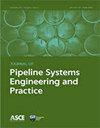A Decision-Support System for Assessing Cross-Country Pipeline Systems: Approach Based on Evidential Reasoning and Cost–Benefit Analysis
IF 1.7
4区 工程技术
Q3 ENGINEERING, CIVIL
Journal of Pipeline Systems Engineering and Practice
Pub Date : 2023-02-01
DOI:10.1061/jpsea2.pseng-1327
引用次数: 0
Abstract
This paper outlines a decision support model based on Evidential Reasoning (ER) and Cost-Benefit-Analysis (CBA) to support the assessment of risk control measures for pipeline loss of containment following third party damage. The model identifies the main Risk Control Options (RCOs) as basic attributes, which are grouped into three categories: technical or technological, governmental and managerial solutions. The CBA examines the costs associated with the loss of containment in regard to human safety, the economic and environmental aspects that are required to reduce or eliminate the threat of using RCOs. ER is chosen because of its capability in dealing with Multiple Criteria Decision Making (MCDM) problems with uncertainties, aggregation of conflicting information and the hybrid nature of the information. This corresponds with the challenges of analysing different and often conflicting information identified in this study. The results show the attributes of each decision, their effectiveness in reducing the failure likelihood and the estimated cost of each attribute. The study reduces the complexity of the decision-making into a simple hierarchical output and provide guidance to the infrastructure operator. This makes it possible for the operator to select one or more risk reduction attributes and immediately see a potential reduction in the failure likelihood. Furthermore, the study provides knowledge to the operator on budgetary expenditure required to implement the RCO.跨国管道系统评估决策支持系统:基于证据推理和成本效益分析的方法
本文章由计算机程序翻译,如有差异,请以英文原文为准。
求助全文
约1分钟内获得全文
求助全文
来源期刊

Journal of Pipeline Systems Engineering and Practice
ENGINEERING, CIVIL-WATER RESOURCES
CiteScore
3.80
自引率
10.00%
发文量
82
期刊介绍:
The Journal of Pipeline Systems Engineering and Practice is a professional, authoritative technical resource that reports on a broad range of topics pertaining to the planning, engineering, design, construction, renewal, safety, operation and maintenance, asset management, environmental aspects, and sustainability of pipeline systems.
An important technical reference for researchers and practitioners from academia, industry, and government, it presents in-depth information on water distribution and transmission systems, wastewater collection systems (gravity and force mains), storm sewers and drainage structures/culverts, oil, gas, industrial, slurry, pneumatic and capsule pipelines, as well as conduit applications for power and communication cables.
 求助内容:
求助内容: 应助结果提醒方式:
应助结果提醒方式:


